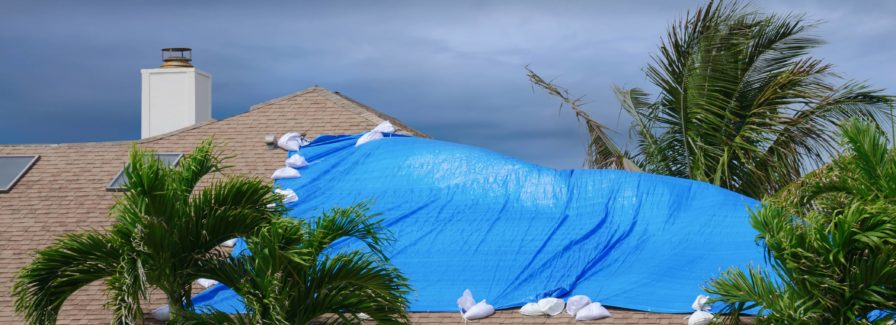
Posted on March 14, 2022 by Duval Home Buyers in Sellers
Disaster in Real Estate: When Is It Time to Sell?
Floridians are no strangers to natural disasters. From hurricanes to floods, Florida’s unique coastal environment trades safety for natural beauty, and unfortunately each year thousands of homes are severely damaged or even destroyed by these phenomena. And natural disasters aren’t the only kind that afflict Florida’s homeowners. Losing a job, a serious theft, or personal injury can also be disasters that while not affecting the home itself, affect a homeowners ability to maintain and pay for it.
Sometimes in the wake of such disasters homeowners feel trapped and overwhelmed by fights over insurance payouts, issues with contractors, rising insurance rates, and temporary displacement. At the end of the day, for some, the best course of action might be to simply sell the home and start fresh.
Florida: water water everywhere
It should come as a surprise to none that Florida has an exceptionally wet climate. The state is a peninsula, meaning it is surrounded by water on three sides. In Florida’s case, the Atlantic ocean on the East Coast, and the Gulf of Mexico on the West and Florida Panhandle. Additionally, Florida is a flat state with much of the land mass lying at or under sea level. Combined with natural marshes, swamps, and one of the largest Freshwater marshlands in the United States: The Everglades, the climate is humid, and prone to groundwater flooding.
This wet climate hosts a number of risks that can quickly turn into a real estate disaster. Excess moisture in the air means more rainfall, and when combined with a low elevation and high groundwater saturation, flooding is often the result. Homes that are not constructed above grade or on blocks can quickly suffer from water intrusion during severe rainfall. Water intrusion can cost tens of thousands between replacing destroyed furniture, replacing water drywall and flooring, water remediation to remove mold growth, and the costs of displacement, and can take months to years to remediate.
Flooding also raises insurance rates, and many of the areas of Florida require federal Flood Insurance through FEMA. Flood insurance programs (FNIP) can add thousands to your annual mortgage bill. Some homeowners may find that when the flood waters come in, the best thing to do is cut their losses and sell their homes.
Hurricane Season
Each year between June 01 and November 30 the Northern Hemisphere enters tropical cyclone season, also known as hurricane season. Hurricanes are severe tropical storms that often form in the warmer waters of the South Atlantic or Caribbean Sea before making their way North towards the Carribean Islands and eventually, the US mainland. Florida is one of the most often impacted US States, and the proximity to the ocean provides the fuel hurricanes need to maintain their deadly winds and rains, amplifying their destructive power.
Dozens of hurricanes have impacted Florida in the last decade alone, causing billions of dollars in damage to homes. Winds can rip off roofs, flying debris can smash windows, falling trees can crush houses, and storm surges can even pull waterfront homes into the sea.
The increased risk for Florida homeowners is often felt in the pocket even when not affected by hurricane damage. Higher insurance premiums and difficulty insuring at-risk homes can be a headache, and can even impede the sale of a distressed home.
For many homeowners, recovery after a hurricane is simply too intensive and painful. Selling a finding a safer place to live can be appealing, and may be a sound financial decision depending on the circumstance.
WDO
WDO or wood destroying organisms is a term for any biological destruction of wood in a home. The most common forms of WDO include insects such as termines, and Mold.
Florida is a host for multiple types of termites which can cause tens if not hundreds of thousands of in damage when left untreated. The two most common are subterranean termites, which burrow up into homes from the ground, and drywood termites which blow in on air currents before setting in roofs and rafters. Remedies can include tenting and fumigation, and can take days or weeks to identify and fully remediate.
Mold is also a common form of WDO in Florida. The humid and hot climate is a breeding ground for mold and other micro organics which can rot wood, weaken the structural integrity of a home, and even cause severe health issues for the occupants.
Individuals who find that their home is infested with WDO often decide that selling the home is a preferable alternative to years of treatment.
Financial Disaster
Aside from natural disasters, personal disasters can also severely impact a homeowners decision on selling a home. The loss of income can make paying a mortgage difficult, and unpaid medical bills from an accident can cause medical bankruptcies and foreclosures, costing the homeowner the home entirely.
Deferred maintenance during an injury can also leave a home in deteriorating condition, and failure to make repairs or sell to an individual who can maintain the home can cause further damage, risk, and even possible injury.
Downsizing, or simply selling altogether is often a strong exit strategy when faced with a personal or financial disaster that leaves a home and mortgage as a strain on personal well-being and finance.
Selling after a disaster
For some, selling after a disaster might look like any other traditional sale. After insurance claims have been paid, insurance coverage replaced, and the home is fully repaired, and agent may list the home on the market in an effort to find a buyer more willing to tolerate the risks associated with the property.
For many however, there simply isn’t time to wait for insurance payouts, repairs, or other forms of remediation. Displacement and financial constraints can quickly become overwhelming, and selling as soon as possible is the most appealing solution.
A cash home buyer like Duval Home Buyers can buy the home as-is, and can even ensure you take your insurance payout in cash after the fact. They can close despite flood risks, and despite any hurricane or flood damage to the property. In many cases they even pay the closing costs saving you thousands of dollars.
Homeowners in Florida should consider the risks associated with natural disasters and should ensure they explore all possible contingencies in the event that a disaster should strike them or their home. It’s always better to be prepared!
